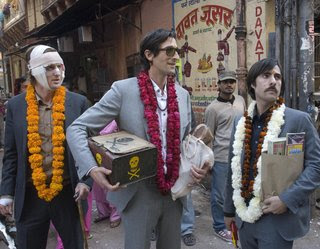Willa's Flic Pic: The Darjeeling Express * * * ½

The Darjeeling Express
- Wes Anderson
- Drama/Comedy, 2007
- R
- Trailer
* * * ½
Francis: You don't love me!
Peter: Yes I do!
Jack: I love you too, but I'm gonna mace you in the face!
I’ve seen all of Wes Anderson's films except for Bottle Rocket, which I just put on my Netflix list. Anderson is the producer, writer, and director of all his films, including the more well known Rushmore.
The common theme throughout Anderson’s films is outrageous characters and the function of families full of outrageous characters. Although most may watch his films and think they don’t identify with his characters, looking from the outside in, more of us resemble this behavior than we may perceive or want to admit.
After his success with Bottle Rocket and Rushmore, I wonder if the reviewers grew tired of his theme. There are not nearly as many rave reviews for The Life Aquatic with Steve Zissou and The Darjeeling Express, both of which I really enjoyed.
If you are a casual moviegoer, you may simply observe strange characters, sometimes in unusual settings, doing completely nonsensical things. "What are they doing?" and "why did he say that?" will run through your head often. But, as in real life, what we say and what we try hardest not to say is what holds an infinite number of subtleties about our relationships and ourselves.
 For me, Anderson’s films are a great experiment in the complexities of communication in the family dynamic. A father may say, "Change the channel to whatever you want to watch," but the meaning may be, "I'm making a gesture of being polite but don't you dare change the channel."
For me, Anderson’s films are a great experiment in the complexities of communication in the family dynamic. A father may say, "Change the channel to whatever you want to watch," but the meaning may be, "I'm making a gesture of being polite but don't you dare change the channel."These are the subtleties that Anderson plays with in very absurd and comic ways with only a sprinkling of heart wrenching sadness, just enough to make you realize he's just made a point but not so strongly that you leave the movie sad and depressed.
The Darjeeling Express is a complicated tale of three brothers reuniting after a year. What happened a year ago and since is revealed casually throughout the story. When you are finally equipped with a modicum of this information, you must think hard to look back over the outrageous behaviors throughout the film and recognize how it explains that odd behavior, very much like life itself. We forget all of the revealing moments and thus fail to interpret "Change the channel" in the way it was intended.
 Anderson also has a beautiful style with the camera. Color and perspective are extremely important to his compositions. This is really played out in The Darjeeling Express, which is set in the rich and colorful India. Anderson does such a great job with the filming that you can almost smell and feel each scene; it's very immersing.
Anderson also has a beautiful style with the camera. Color and perspective are extremely important to his compositions. This is really played out in The Darjeeling Express, which is set in the rich and colorful India. Anderson does such a great job with the filming that you can almost smell and feel each scene; it's very immersing.Anderson also incorporates what I call living dioramas – a very brief close-up of a small scene with one character and only small movements that tell a one-sentence story. This is a very daring technique given the stress of efficiently using the two-hour length of film and your audience's brief attention span.
I haven't mentioned anything about the cast but it is stellar. Like Joss Whedon and M. Night Shyamalan, Anderson has cast some of the same actors throughout all of this projects: Owen Wilson, Adrien Brody, Bill Murray, and Jason Schwartzman. They all seem to understand the importance of Anderson's efficient use of dialogue and movement.
For a study of dialogue and the power communicated through actions, use Anderson's films as some of your subject matter.
Labels: Movie Reviews


1 Comments:
Your review makes me want to rewatch the movie to pay more attention to the overall story. I admit i was watching it too much as a casual viewer asking "what? why?!"
By Violet, at 5:36 PM
Violet, at 5:36 PM
Post a Comment
<< Home